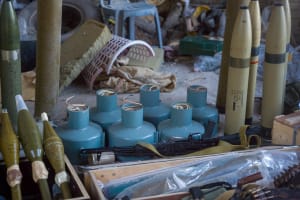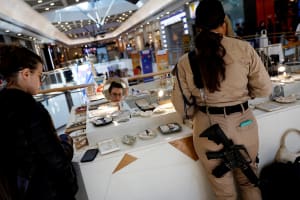Israel to purchase 40,000 tents for Gazan refugees ahead of expected Rafah op

Israel plans to purchase 40,000 tents in preparation for the evacuation of 1.5 million Gazan civilians from Rafah, ahead of an imminent ground operation, an Israeli official confirmed on Tuesday.
The Defense Ministry published a tender on Monday seeking a supplier of 40,000 tents that will shelter some 500,000 people and Israeli officials say they are taking steps to avoid a humanitarian crisis. The Israeli military is hopeful that many civilians in Rafah will self-evacuate and return to Khan Younis, which could decrease the number of tents needed.
On Monday, Israeli Prime Minister Benjamin Netanyahu said that a date is set for the IDF to enter Rafah, though no operation is anticipated for the immediate future.
The prime minister announced that he had authorized IDF operational plans for the southern Gaza town of Rafah at least four times over the past two months, but nothing has moved forward due to ongoing concerns from the United States and international pressure regarding the operation.
Israel Defense Forces completely withdrew from Khan Younis on Sunday, shrinking the size of its troops in Gaza considerably.
The IDF also carried out strikes across the Gaza Strip overnight, killing a terrorist who participated in the Hamas massacre on Oct. 7 that took the lives of 1,200 and about 250 captive in the coastal enclave.
Netanyahu has said that if the Rafah operation isn’t launched, Israel won’t be able to achieve its stated goals of dismantling the Hamas terror group, including the four remaining battalions believed to be stationed there.
Rafah, situated near the Egyptian border, is believed to be the location where Hamas leaders are concealing the remaining hostages from Israel.
The population of Rafah has swelled to 1.5 million people since the start of the war, making up half of Gaza’s total population. In October of last year, IDF troops instructed Gazan citizens to evacuate southward before they launched a full ground operation in the northern and central parts of the Strip.
The international community, including the U.S., is strongly opposed to an Israeli offensive in Rafah, citing concerns over endangering civilians and a potential humanitarian catastrophe.
On Monday, a U.S. proposal for a temporary ceasefire and possible release of some hostages still being held in the Gaza enclave was denied by the Hamas terror group, which argued that the proposal failed to meet enough of their demands.
After six months of war, Hamas said it was “examining” a new proposal for a temporary truce submitted during talks with U.S., Qatari, and Egyptian mediators. Under the plan, which would include a six-week ceasefire, 40 women and child hostages would be exchanged for hundreds of Palestinian prisoners, and up to 500 humanitarian aid trucks would enter Gaza every day, a Hamas source said.
According to The Times of Israel, Hamas said it “appreciates” the mediators’ latest efforts but accused Israel of failing to respond to its long-standing demands, including a full withdrawal of military forces from Gaza.
Israel has rejected that condition, along with the demand that tens of thousands of displaced Gazans be permitted to return to their homes in central and northern Gaza. Israeli officials have stated that Jerusalem is aiming for an agreement that ensures Hamas doesn’t use the situation to reposition itself in northern Gaza.
Since Monday, the Israeli Air Force (IAF) has struck several sites across Gaza belonging to terror groups, including a building and tunnel shafts next to a rocket launch site used on Monday to attack Kibbutz Re’im near the Gaza border, according to the IDF.
“Troops eliminated a number of terrorists in close-quarter combat,” it said. “Several additional terrorists who posed a threat to the troops were eliminated by aircraft strikes and precise sniper fire.”
The IDF also confirmed carrying out a strike in Gaza’s Maghazi camp on Sunday night killing Hatem al-Ghamri, the head of the 'so-called' emergency committee run by Hamas in central Gaza. The committee is allegedly responsible for maintaining order and civil control in Gaza's municipalities. Palestinian media reported that at least five people were killed in the strike.
In addition to being head of the emergency committee, Al-Ghamri was also an operative in Hamas' military wing and responsible for rocket fire from the Maghazi area, according to the IDF.
On Tuesday, United Nations Secr.-Gen. António Guterres called for Israel to allow foreign journalists to enter the Gaza Strip, claiming that an “information war” is compounding the conflict.
“Denying international journalists entry into Gaza is allowing disinformation and false narratives to flourish,” he wrote on 𝕏.
His statement came alongside a Foreign Press Association (FPA) call for Israel to allow the foreign press to return to Gaza.
“The barring of independent press access to a war zone for this long is unprecedented for Israel,” the statement read. “It raises questions about what Israel does not want international journalists to see.”
“The decision whether to be on the ground in Gaza should be up to each individual international media outlet,” the FPA added. “The blanket ban has limited the world’s ability to witness the true cost of the war to all sides.”
In January, the High Court ruled that Israel could continue to prohibit foreign journalists from accessing the Strip due to ongoing security concerns. Only correspondents working in Gaza or journalists escorted by the IDF have had the opportunity to report from within the enclave.
In their ruling, Israeli High Court justices Ruth Ronen, Khaled Kabub – Israel's first Arab-Muslim justice on the court – and Daphne Barak-Erez accepted the Defense Ministry’s stance that the escorted tours provided an appropriate measure of press freedom given “extreme security concerns at this time and concrete security threats that go with approving entry permits for independent journalists.”
We recommend to read:

The All Israel News Staff is a team of journalists in Israel.
















